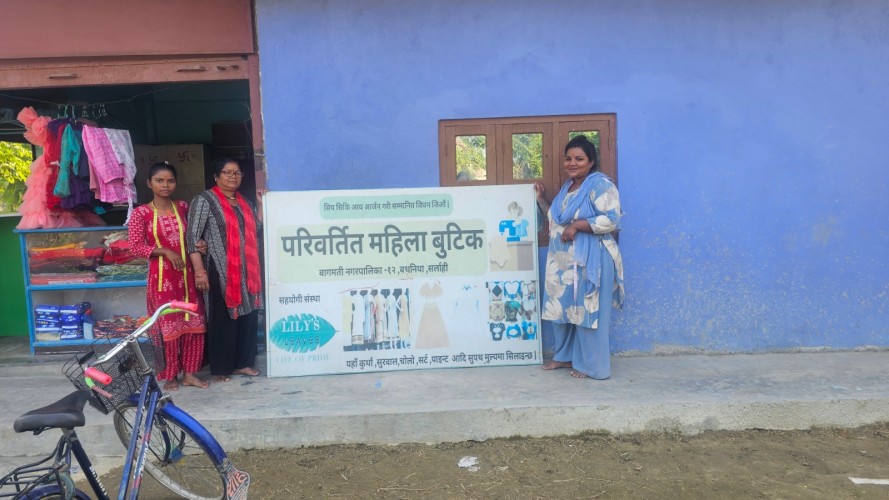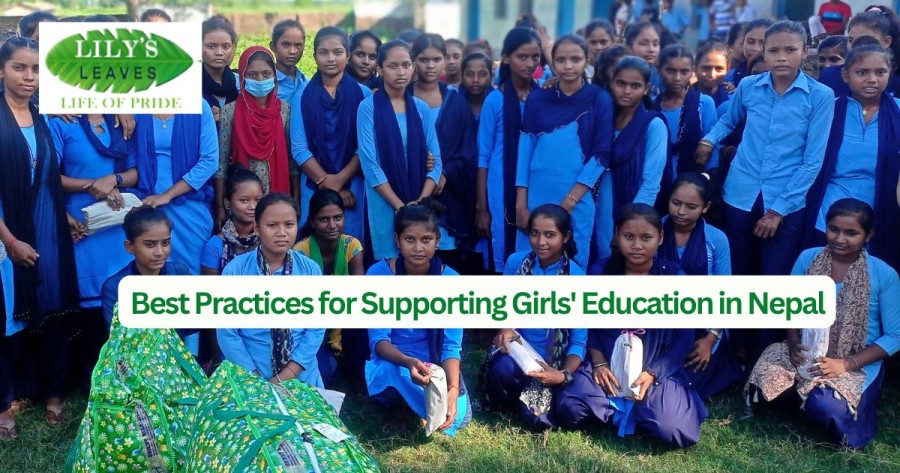




In Nepal, girls’ education is more than a basic right—it is a path toward social transformation. But many girls still face barriers that prevent them from continuing school, especially in rural or marginalized communities. The road to school can be difficult, with obstacles ranging from poverty and early marriage to gender bias and limited access to sanitary supplies but with some of the Best Practices for Supporting Girls' Education in Nepal, it will be easy.
According to the UNICEF Nepal Country Office Annual Report 2023: {link}
Nearly 40% of girls aged 15–19 in Nepal are not engaged in education, employment, or training (NEET rate).
56% of girls in rural areas drop out before completing lower secondary education.
1 in 3 girls in Nepal is married before age 18, significantly impacting their education.
Only 66.4% of adolescent girls complete lower secondary school.
These figures show that despite progress, gender disparities in education remain a significant challenge, especially for girls from low-income or remote regions.
Organizations like Lily's Leaves are promoting the finest methods for assisting girls' education in Nepal in order to overcome these obstacles. Through a blend of compassion, strategy, and community empowerment, they are not only changing individual lives—they're reshaping the future of the nation.
Before diving into the best practices for supporting girls’ education in Nepal, let’s understand the root causes that prevent girls from accessing education:
Expectations to do chores at home and child marriage
Many illiterate parents in Nepal believe that investing in girls' education is a waste, as they assume she will eventually marry and leave for another household.
Social stigmas associated with menstruation
Lack of transportation to schools
A narrow-minded society thinks it is hard to manipulate educated girls.
Gender-based violence or unsafe school environments
Poverty, which prioritizes boys’ education
These are not just logistical issues—they're deeply ingrained societal problems that require thoughtful, grassroots-level solutions.
Education isn’t just about textbooks—it’s about preparing for life. In Nepal, many girls face pressure to leave school early due to poverty, gender roles, or lack of opportunity. That’s why combining formal education with practical skill development is one of the best ways to support girls in staying in school and planning for their future.
Lily's Leaves ensures that girls have the skills they need to confidently apply their knowledge by combining academic support with hands-on training.
The following are some ways that skill development is changing schooling for girls:
Tailoring and Garment Production
Girls learn to sew and create garments, gaining a skill that empowers them to earn an income. Many use this income to buy school supplies, pay tuition, or support their families, making continued education a real possibility.
Jewellery Making
Through creative and skillful jewellery design, girls express themselves while building products they can sell. This boosts their confidence and teaches them the value of craftsmanship, design, and entrepreneurship—all while staying in school.
Forest and Nursery Training under the Urban Natural Project
Girls are trained in plant care and nursery management, contributing to local reforestation while discovering new career paths in environmental sustainability. This also reinforces lessons in science, ecology, and responsibility.
Natural Product Creation (Reusable Pads, Eco-Bags, etc.)
An important challenge that results in school absences during menstruation is addressed when girls learn how to produce eco-friendly products and reusable sanitary pads. They secure their own right to education while also becoming change agents by producing and distributing these goods.
Each of these skills makes a tangible difference. When girls can earn while they learn, they’re less likely to drop out and more likely to gain the confidence, independence, and motivation to chase bigger dreams.
It’s not just education. It’s empowerment through purpose.
Menstruation remains one of the biggest silent barriers in Nepal. Many girls drop out of school due to shame, stigma, or lack of access to sanitary products.
Lily’s Leaves addresses this directly:
We provide eco-friendly, reusable sanitary pads
We run awareness campaigns that normalize menstruation
We train young girls as peer educators, ensuring knowledge spreads organically
By creating a safe space to talk about menstruation, we ensure girls can attend school every day of the month.
In Nepal, many girls face significant barriers to education, with financial constraints being one of the biggest hurdles.
The cost of uniforms, school materials, and menstrual health products can be too much for low-income families, causing girls to drop out of school early. Addressing these barriers is a key part of the best practices for supporting girls' education in Nepal.
Here's how Lily’s Leaves is making a real difference:
Covers essential school needs: Many girls drop out because they can’t afford bags, uniforms, or sanitary pads. These are basic needs, but for low-income families, they're unaffordable luxuries.
School bag distribution:
In 2078/79, 694 school bags were provided.
In 2079/80, the number increased to 1,351.
By 2080/81, 2,064 bags were distributed.
In 2081/82, 1,239 more bags reached girls in need.
Menstrual health support:
Lily's Leaves provided 2,803 reusable sanitary pads in 2080–81.
In 2081/82, 827 additional pads were provided, helping girls attend school with confidence and dignity.
Uniforms for school retention:
In 2081/82, 122 girls received full school uniforms, removing yet another financial barrier to education.
When we talk about the best practices for supporting girls' education in Nepal, promoting gender equality in education is one of the most powerful ways to create real change.
Whether it's due to social expectations or the restricted possibilities they have in the classroom, girls continue to experience difficulties in many communities that boys do not. What practical influence would gender equality have on girls' education, then?
Equal Classroom Participation:
Picture a classroom where both boys and girls are urged to speak out, ask questions, and lead discussions. We must cultivate an atmosphere like that.
Girls become more self-assured and believe in their own abilities when they participate equally. Girls' academic achievement and general self-esteem are strongly impacted by equal involvement, which goes beyond simply making them feel good.
Gender-Sensitive Curricula:
It’s not just about letting girls into the classroom—it’s about creating a curriculum that represents them too. A gender-sensitive curriculum challenges the traditional stereotypes and includes women’s accomplishments in various fields.
When girls learn about inspiring women in science, politics, or history, it gives them role models to look up to. This not only makes them feel seen but also encourages them to believe that they, too, can succeed in those fields.
Breaking Down Social Barriers:
Cultural norms may restrict what girls can study or pursue as a job in various parts of Nepal. Girls are given the opportunity to realize their full potential when gender equality is promoted.
Creating a Supportive Environment:
At last, a gender-equal educational system creates a welcome environment in which girls feel heard, respected, and safe. This encouragement, whether from peers, professors, or family members, keeps people motivated and devoted to finishing their studies and reaching their goals.
Fighting for gender equality in education gives girls the opportunity to become leaders, change agents, and role models for future generations, in addition to enabling them to continue their education.
When a girl in Nepal receives the education and support she deserves, it sparks a ripple effect of transformation. She gains confidence, becomes skilled, earns an income, and ultimately inspires others around her.
The best practices for supporting girls’ education—such as community-led initiatives, menstrual health awareness, financial assistance, vocational training, and safe learning spaces—aren’t just strategies; they are powerful commitments to changing lives.
At Lily's Leaves, this transformation is already underway. Supporting their goal does more than simply help a girl go to school; it also helps her build a brighter future and empowers her to impact the world.
1. What are the biggest challenges to girls' education in Nepal?
Cultural norms, child marriage, financial hardship, lack of menstrual support, and unsafe environments are major barriers.
2. How does Lily’s Leaves help girls get educated?
They provide skill training, menstrual hygiene products, scholarships, mentorship, and safe learning spaces—especially for deaf and underprivileged girls.
3. Can skill development replace traditional schooling?
Not replace, but complement it. Lily’s Leaves combines formal learning with practical skills so girls become self-sufficient and confident.
4. Why involve boys and men in girls’ education?
Because true gender equality involves everyone, boys and men can challenge harmful norms and become allies in change.
5. How can I support girls’ education in Nepal through Lily’s Leaves?
You can donate, volunteer, or buy their eco-friendly products. Every action supports a girl’s journey to education and empowerment.
654 views
CEO representing Lily Leaves in '9th COMMUNITY CONFERENCE" organized by The British School.
One-Day Workshop At Lily Leaves - 17th June 2023
Lily was joined by Santosh Shah, a former student of the school and winner of BBC's MasterChef.
This act not only empowered the individuals to start their own tailoring businesses
CEO Lily Katuwal and a group of visitors from Lily Leaves Social Enterprises distributed 135 school bags and uniforms in Bandipur, Siraha, demonstrating a commitment to social responsibility and fostering positive change in education for students facing financial challenges.
Volunteer from rato Bangala school Environment club
Explore how Lily’s Leaves empowers women through sustainable fashion, blending ethical craftsmanship with eco-friendly designs for a better future.
Rebuilding Nature in Swayambhu!
Equipped with new skills and gifted sewing machines, they're ready to launch their own businesses or join local enterprises.
Monkeys of Swayambhunath: Addressing Health Challenges with Care and Awareness
30 Grade 9 students from Rato Bangala School keeping Swoyambhu Clean & Green.
Lily Leaves handed out durable bags to Class 1-3 students at Saraswoti and Seti Devi Schools
We recently had the chance to speak at Kathmandu Forestry College (KAFCOL) on the topic “Greening Kathmandu: Urban Forestry through the Miyawaki Method.”
Bringing Life Back to Swayambhunath Religious Forest, a UNESCO World Heritage Site
Empowering Women & Ecosystems: Dhanushadham Wildlife Corridor Project Advances Community-Led Conservation
Recent protests across Nepal, especially the Gen G demonstrations, have seen streets filled with thick, black smoke from burning rubber tyres and plastics.
Grain feeders and water tubs installed in urban forests help retain birds and support ecosystem restoration.
We are overjoyed to share a milestone for our planet and our heritage: the Swoyambhu Religious Forest Reforestation Project - II is now complete!
Together, we can celebrate with joy and responsibility, embracing eco-friendly ways that honor both tradition and Earth.
Seeing their lives transform fills our hearts with pride and joy.